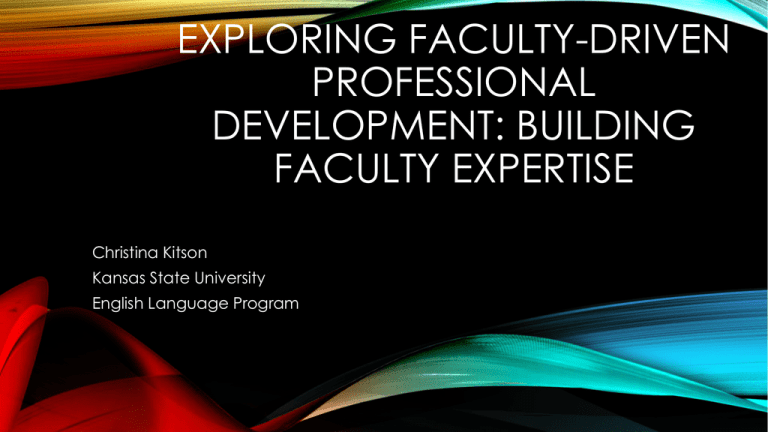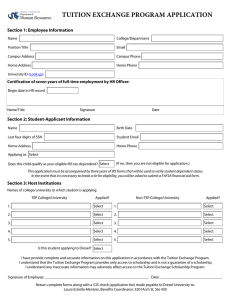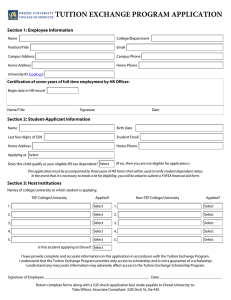EXPLORING FACULTY-DRIVEN PROFESSIONAL DEVELOPMENT: BUILDING FACULTY EXPERTISE
advertisement

EXPLORING FACULTY-DRIVEN PROFESSIONAL DEVELOPMENT: BUILDING FACULTY EXPERTISE Christina Kitson Kansas State University English Language Program WHY ARE WE HERE? • Many programs require Professional Development • If you are new you need to learn about the system in your new department • Maybe you’re not new but you don’t know what to do • It is important to understand if Professional Development is a requirement or a suggestion • Will it be included on teacher evaluations? • Will it be used for promotions? • Will it be used for any decisions? HOW I CAME TO THIS… • I started at Kansas State University in the fall of 2011 • I was hired as an instructor • 80% Teaching • 10% Service • 10% Professional Development • First full-time teaching position • Still working on PhD at a different institution • I understood the Teaching and Service portion, but… • Professional Development? PROFESSIONAL DEVELOPMENT • What is Professional Development? • Here are two possible definitions • “The process of obtaining the skills, qualifications, and experience that allow you to make progress in your career” (http://www.macmillandictionary.com/us/dictionary/american/professionaldevelopment) • “The advancement of skills or expertise to succeed in a particular profession, esp. through continued education” (http://dictionary.reference.com/browse/professional+development) TWO MAJOR IDEAS • Skills and expertise • Show progress and improvement in your field • So for ESL teachers professional development could be seen as: • Something that builds an individual’s knowledge in the practice of teaching English as a second or other language, in the field of teaching, in working with people from diverse backgrounds, in handling the administrative side of teaching, and anything else that can be seen to improve the ability to teach. SO WHAT DOES THAT MEAN FOR YOU? • The first step is to find out what will count as Professional Development in your department… • Examples • Taking a class in Education, ESL, Linguistics, English • Maybe a class in a foreign language or one that your students might have to take as they leave your program • Cultural events on campus (provided by different student groups or organizations) • Online training and courses • Conference attendance (local, regional, national, and international) • Presentations at conferences or schools BRAINSTORMING TIME • Please take five minutes and find people in a program similar to yours and brainstorm what might count as professional development. • Anyone want to share? HOW TO FIND OPPORTUNITIES • University or College calendar • Community calendar • Professional Organization calendar (like TESOL, AAAL, NAFSA, AERA, etc.) • Publishers (many offer online training: Pearson, Cambridge, etc.) • Subscribe to listserves that are in your field (like those from the professional organizations already mentioned) • Utilize the departments on your campus that share similar interests • Classes at your school • Classes online • Language or diversity events on campus • And more… BRAINSTORMING TIME • Please take a few minutes and find people in a program similar to yours and brainstorm where you might find professional development opportunities. • Anyone want to share? WHAT CAN THE DEPARTMENT DO? • Provide a list of possible opportunities • A specific list (events that are coming up, are local, are free) • A detailed calendar updated weekly with opportunities • A weekly email sent to all the staff that outlines opportunities • A generic list (just ideas of what will count, conference attendance, classes) • Provide links to calendars • Email links when they are found WHAT CAN THE DEPARTMENT DO? • Explain the requirement (if there is one) • Appropriate amount of time can be dedicated • Transparency in teacher evaluation of the requirement • Provide some money for individual development • Have a system in place before you start • Applications, process, rubrics • Faculty driven for fairness • Allocate maximum amounts for various activities WHERE WE STARTED • Sometimes we had money to send a few teachers to TESOL… • They were picked by the administration • In an effort to make things fairer a committee was formed… • The Professional Development Committee started in fall of 2011 • It had a chair and four members (all faculty, one with release time) • Their task was to create a system for funding teachers to TESOL • An application and rubric was created WHERE WE ARE NOW • There are multiple application systems • • • • • Major Conference (TESOL, AERA, AAAL, etc.) Minor Conference (local area small conferences, like MidTESOL) Tuition & Fees Scholarships (help paying tuition, or fees for university class) Online training (for webinars or online training courses) Presenters Conference (for anyone presenting work related to the program) • For each system there are three parts • Process document • Application • Rubric MAJOR CONFERENCE • Make sure you know what constitutes a Major conference: • We used size and relation to ESL teaching • Know how many faculty can attend the same event • Can you have 12 people gone at one time? • Put a cap on the number of people gone at one time • This would include other leave • How much funding should each person get • • • • Decide a maximum budget for each person It needs to be reasonable Would people be willing to pay part of the expense themselves? Advertise how the budget will work before applications are due MINOR CONFERENCE • Make sure you know what counts as a Minor Conference The name is misleading… How many people can be gone at one time? This is a little different as it should be for a shorter time Could let everyone go and cancel classes for an afternoon (something like MidTESOL) • Would still have to have a cap if everyone can’t go • • • • • How much funding should each person get • Need to have a maximum for each person • This needs to be realistic • Are people willing to help with the cost to be able to attend TUITION OR FEES SCHOLARSHIP • You can only apply for one at a time • Those that have never received a scholarship get first priority • Tuition Scholarship • Used to pay for a credit hour of university classes (we get three paid for by the university already) language classes are 4 credit classes • Has to be a class taught by modern languages at KSU • Fees Scholarship • Used to pay for the university fees for a 3 credit hour university class (must be connected to education, linguistics, language learning, etc.) • The burden is on the applicant to explain why the class they want funded counts • This allows a faculty member to take a university class completely for free ONLINE TRAINING • Money to be used for any online training, class, or webinar • Like TESOL webinars, Online short courses, etc. • Bonus on rubric for something more than one person can attend • Needs to be something of direct benefit to the program • The burden is on the applicant to prove the connection to the program • The committee has to decide to fund one expensive event or several smaller events PRESENTERS • Funding those that have been accepted to present at Major or Minor conferences • They have to apply for the presentation on their own • Have a cap (it might be different for different types of presentations) • Decide what presentations you plan to support • Does it have to present something done in your program/department • Does it matter what type of presentation (poster, session, research, etc.) • Do the presenters have to present for your own faculty RUBRICS • General • • • • • • Make sure that they are available prior to application deadlines Have a minimum score (that way you are not supporting poor attempts) Have four people review and average the scores Chair/Lead should not score (unless needed) Applications can be anonymous (your choice) Base funding decisions off scores, if you have a tie the chair/lead can make the call • Does the presentation have to be based on something from the program? • You need to know how often faculty are eligible • Anyone get preference? Cost sharing, presenters, length of time in program? WHO DOES THIS? • All of this is contingent on having people to do the work, setting it up… • And the MONEY! • We were fortunate enough to get funding from our program • Our PD committee • Made up of faculty • Headed by an administrator • Outside participants are also needed (to review applications, etc.) • People have to WANT to participate • A clear system makes this easier • The process needs to be transparent WHAT ELSE CAN YOU DO? • What faculty can do on their own: • Find opportunities • Share opportunities • Free opportunities • Don’t forget about these opportunities • Share with faculty • Create your own opportunities• Try a mini-conference for your department using peers • Find other departments on campus to work with and develop a partnership THANK YOU!

